To cast your ballot and then sit back, hoping for miraculous change, will just not cut it.

South Africa is a few weeks away from what seems to be the most contested and anticipated election, arguably, since April 1994.
For numerous reasons, South Africans are gearing themselves up to exercise their democratic right. A record number of 48 political parties will appear on the national ballot on May 8 – 19 more than those registered in 2014, against only 27 political parties that contested elections in 1994.
Because elections form a key component of democracy, citizens are afforded an opportunity every five years to elect their representatives who will hold public office. In the upcoming elections, there will be more than 26 million people on the voters’ roll eligible to carry out this task.
Young people also seem to have heeded the call to register to vote, as the IEC reported that during the final registration weekend, more than half a million people who registered to vote in this year’s general elections were young people.
Due to the rising sense of euphoria, you would be forgiven for thinking that South Africans are going to elections for the first time.
There is this distant belief that the upcoming elections will deliver some form of unprecedented miracle in as far as development and a better life for all are concerned.
While this mood is commendable, it must be accompanied with a sense of caution that says citizens still have a responsibility to work hand in hand with the government of their choice post the elections.
Therefore, to vote and sit back, hoping for miraculous change will just not cut it. Government must still be held accountable. Government must continue to create a conducive environment for citizens to flourish. A robust civil society, and a free, independent and unbiased media must hold the government of the day accountable.
Citizens must seek out opportunities as presented by a democratic dispensation, as no proverbial manna will fall from the heavens.
We all know too well how dangerous euphoria without action can be. Just across the Beitbridge, when the bell finally rang signalling an end to decades of former president Robert Mugabe’s reign, there was a lot of excitement and euphoria among Zimbabweans inside and outside of Zimbabwe. But because it takes more than an occasion like elections or a change of faces to effect meaningful development, citizens must work hard together with their government to be true agents of the development they desire.
It is about citizens taking advantage of opportunities presented by the democratic dispensation, starting from the right to the franchise to various opportunities aimed at improving the lives of citizens. We cannot deny that despite what may seem like lingering pains as a result of sins from the past, we dare not be despondent.
South Africans must continue to seek out and take advantage of opportunities gradually opening up in areas such as commerce, agriculture, education and skills development, entrepreneurship, manufacturing, tourism and many others.
Besides, development literature confirms that knowledge is power and wealth. States with good access to knowledge, be it scientific, technological or otherwise, find themselves in a position of advantage compared to others.
Let us therefore all go out and exercise our hard-earned right to vote!

Sango Ntsaluba
Sango Ntsaluba is executive chair of NMT Capital and co-founder of Sizwe Ntsaluba Gobodo and venture capital firm WZ Capital.
For more news your way, download The Citizen’s app for iOS and Android.






